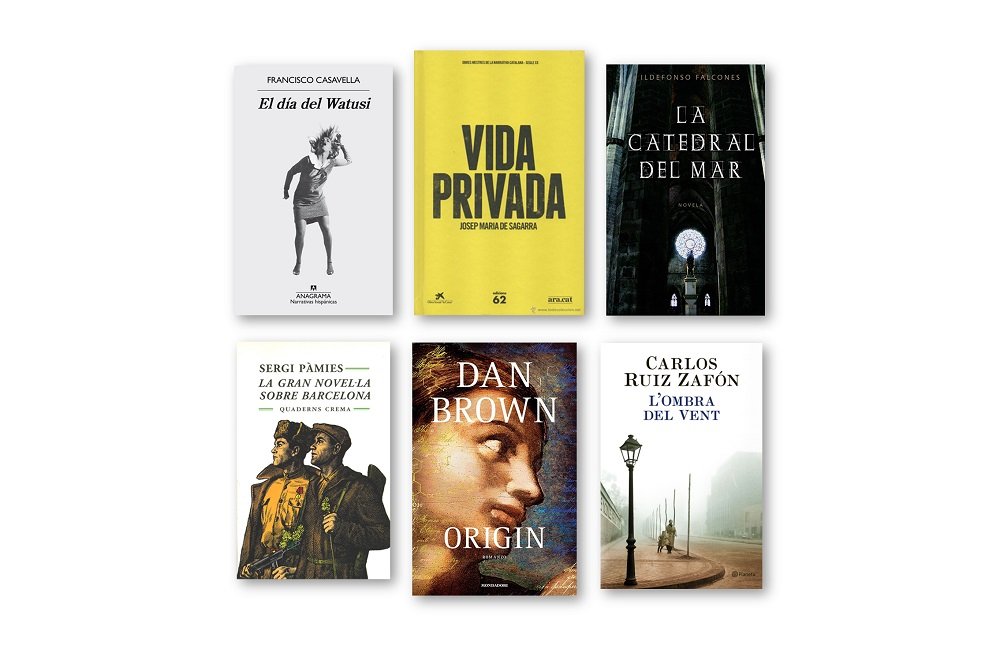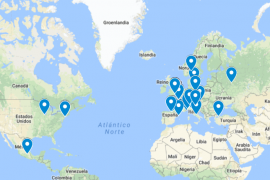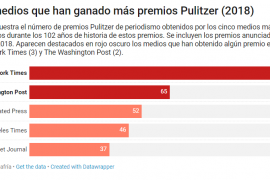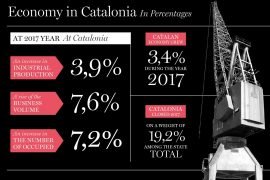[dropcap letter=”A”]
mong the regular controversies that we have in the city, one of those that is repeated often is the one of the great novels of Barcelona [to be read out in a pompous tone]. As in all great universal debates—Yoga or swimming? Sea or mountain? Cream puffs: filled with Chantilly or chocolate mousse?—There is no single answer: the classicals often cite Josep Maria de Segarra’s Vida Privada as the great Barcelona novel—name-dropping Sagarra always makes you look good—while the trendies go for Francisco Casavella’s Watusi trilogy. And then there is Sergi Pàmies, who went straight for it by appropriating the title in 1998 with the collection of stories, La gran novel·la sobre Barcelona (The Great Novel about Barcelona): in the Internet age, that is known as domain squatting. In an impromptu survey, we would surely find readers who would recall the blockbuster tomes set in the city, like The Shadow of the Wind by Carlos Ruiz Zafón, Ildefonso Falcones’ Cathedral of the Sea, or the recent Origin by the incombustible Dan Brown, while a much smaller number of readers would highlight collective attempts to novelise the Catalan metropolis, like the Matar el monstre (Kill the Monster) project by publisher Comanegra, in which seven authors have written seven interconnected Barcelona novels, in a Frankenstein that Joan Esculies has already spoken of here in the NBP.
If there are so many candidates for the great novel of Barcelona it is because the total book of the city is possibly yet to be written, or because the portraits that have been framed are aged, inadequate or partial. In the hope of filling the void, the Barcelona City of Literature programme established the Montserrat Roig grants in 2017. These provide a wage and an office for our scribes—novelists, poets, essayists or playwrights—so they can progress with their projects and can escape the generally precarious circumstance, at least for a couple of months. Thirty authors with thirty projects featuring Barcelona and its inhabitants have so far been funded, and it looks like the intention of the City Council is to go on fostering the literature of Barcelona for many more years.
The latest projects to be awarded were presented a few days ago at the new La Carbonera bookshop in the district of El Poble-sec. In the midst of the select audience—the authors and their relatives—we heard of fascinating projects, such as the novelisation Oliver García Mancebo is preparing on the mystery of the 1981 Banco Central raid in Barcelona, with a book that will have a pick your adventure structure—the technical term is interactive fiction—and will hypothesise on whether it really was an anarchists and hustlers thing, or if there was something murky behind it. Hailing from the Sala Beckett theatrical atelier and playhouse, Basque playwright Mikel Fernandino explores what our authorities would do if we were to wake one day with a Banksy stamped on a wall in the Raval: would they apply civic regulations and immediately erase it? Or would they strappo it off the wall and exhibit it at the MACBA Museum of Contemporary Art of Barcelona? There is also room for essays in the Montserrat Roig grants, and Álex Chico explains that he has worked closely with the Miró Foundation to prepare a piece on immigration, with chapters dedicated to the shanty-towns that populated Montjuïc hill overlooking Barcelona and where the Foundation is now located, while the Catalan-Argentine author Silvana Vogt will set her next book in the episode of extreme drought we experienced in 2008.
And in the autumn, the stories about Barcelona will carry on: 10 more writers will be awarded grants, like historian Miquel Carandell, who will immortalize the centenary history of the taxidermist in the Plaça Reial; Gabriel Ventura will write about two teenagers discovering the world of art in the city and Lilian Neuman will look at the bar El Nus, in the Ribera district.
Novels of Barcelona: Who wants just one when you can have a thousand and one?
Featured image
From top to bottom and from left to right: TEl día del Watusi by Francisco Casavella, Vida Privada by Josep Maria de Segarra, La catedral del mar by Ildefonso Falcones, La gran novel·la sobre Barcelona by Sergi Pàmies, Origin by Dan Brown and La sombra del viento by Carlos Ruiz Zafón.



















